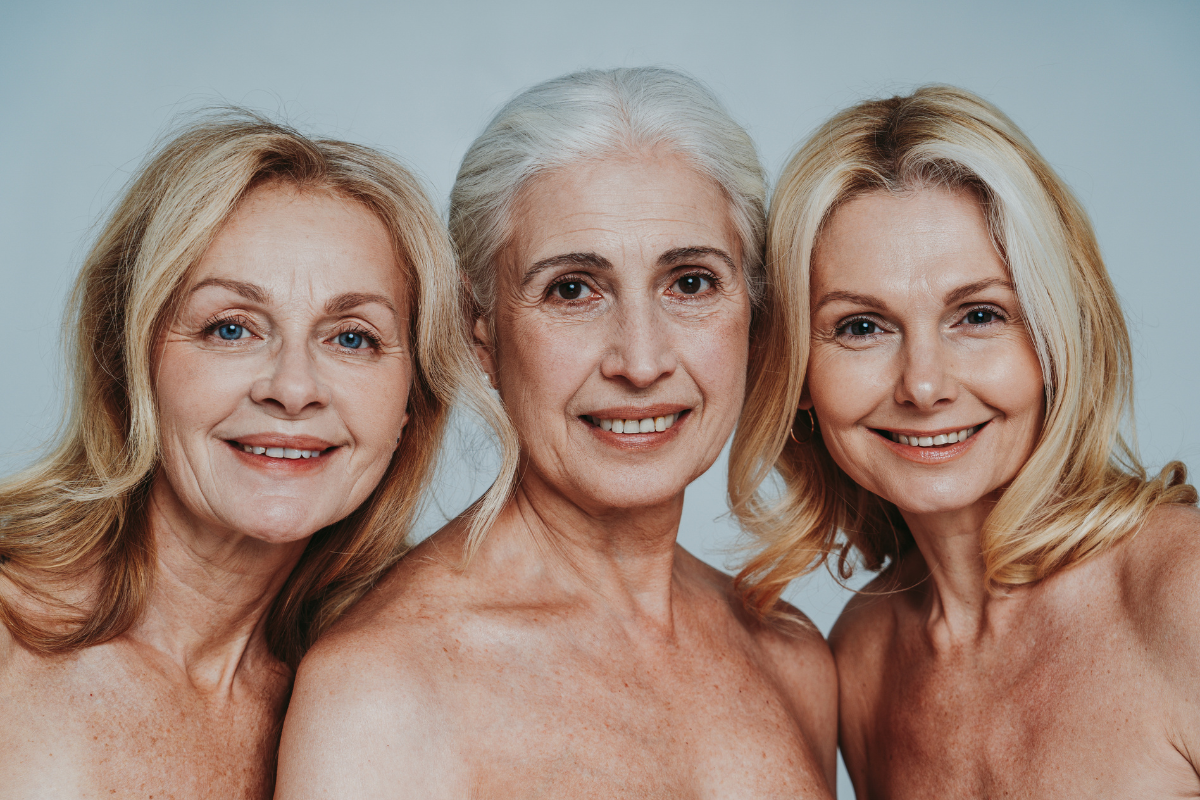
Hormones have become a hot-seat subject in recent years. From calls for increased workplace support for women going through menopause, to the current ‘hormone balancing’ trends on TikTok (in case you weren’t sure, it’s much more complicated than eating a carrot salad every day). Vogue even recently published an article titled “How To Eat Better For Hormone Health”.
But do you actually know what your hormones need? Would you be able to tell if you were suffering from a hormone imbalance? Hormonal imbalances can be tricky to diagnose, because they often look like so many other things.
There are over 50 identifiable hormones in the human body, and they control, regulate, or affect almost all of the processes that your body undergoes each day. What mood you’re in, how well you slept, your digestion, your hormonal cycle (monthly if you’re a woman, every 24 hours if you’re a man) – all of these things are dictated by your hormones, so if they’re out of balance, we can guarantee you’ll be feeling the effects.
Fortunately, a hormone imbalance is no longer something that people simply have to live with. Hormone replacement therapy can be incredibly beneficial, and bioidentical hormone replacement therapy (BHRT) even more so.
What is BHRT Treatment?
BHRT treatment uses bioidentical hormones, which are derived from diosgenin, a plant sterol usually sourced from Mexican yams or soy, which can be converted into human steroid hormones. These hormones are chemically identical to the hormones that are already being produced in your body. Synthetic hormones are produced in a lab en masse, and are structurally different from the hormones your body produces.
“Bioidentical hormones are better for your body. Because they’re structurally identical to the hormones that the body is already producing, they fit receptor cells on sites perfectly, almost like a key to the right lock, and the physiological effects are consistent with the standard response to your own hormones. Our patients generally see fewer side effects, and have much better tolerance toward bioidentical hormone replacement therapy, as opposed to synthetic hormones.”
Dr Ghazala Aziz-Scott, The Marion Gluck Clinic.
BHRT treatment and doses are also tailored to each individual, and the symptoms that they are experiencing.
What is the History of BHRT?
Bioidentical hormones have been the subject of some debate in the medical community, which has given them a slightly unreliable reputation. One of the main controversies around BHRT is its classification as ‘unlicensed’. Naturally, the idea of unlicensed medicine prompts alarm bells, however, it’s important to understand why BHRT has this label.
The individual components of BHRT (such as oestrogen, progesterone, and testosterone) have all been licensed. Compounded BHRT doses are tailor made, and will differ slightly from patient to patient. Because of this, there is no financial incentive for pharmaceutical companies to fund large scale, controlled trials to assess BHRT, as the resulting product cannot be patented, and therefore has limited scope for profit. The surge in online retail has worsened matters, as some BHRT treatments are available online, from unregulated pharmacies with poor quality control. Subsequently, this has led to some negative press for BHRT products. However, if you go to a regulated clinic (such as ours), and ensure you are being assessed by fully licensed doctors, there is nothing to worry about.
Hormone replacement therapy in general has also had some bad press – the recommended licensed HRT that was previously prescribed on the NHS was synthetic HRT, wth oral conjugated equine oestrogen (derived from the urine of pregnant mares), and synthetic progesterones or progestins. This was the treatment used in the Women’s Health Initiative Study (WHI) in 2002, which was stopped early due to evidence of increased risk of breast cancer, strokes and cardiovascular disease. Subsequent studies confirmed there was no link between HRT treatment and increased risk of cancer.
The subsequent media frenzy publically distorted the image of HRT and, and it was reported that many women abandoned their treatment. In hindsight, the study was poorly designed and carried out – it recruited older women, with pre-existing health conditions, and used oral rather than transdermal routes of oestrogen treatment, as well as synthetic progestins rather than progesterone. A meta-analysis published in 2008 revealed that oral oestrogen therapy increases the risk of blood clots compared to transdermal treatment. A follow up study also revealed that out of 80,000 women studied, breast cancer risk was highest in the group that took synthetic progestins, but there was zero increased risk with transdermal oestrogen.
Despite these follow up discoveries, hormone therapy (and BHRT treatment) still have an undeserved reputation.
What is the Evidence That BHRT Works?
It’s all very well and good for us to simply tell you that BHRT is an effective form of hormone balancing treatment, but realistically, everyone wants to see data and results when trying to make a properly informed decision about their medical treatment.
At the Marion Gluck Clinic, we often use bioidentical hormones to treat symptoms of menopause.
Menopause symptoms are commonly tracked on the Greene Climacteric Scale. There are so many symptoms associated with menopause, and it’s sometimes hard to keep track. Keeping track of your symptoms, whether psychological, physical, or vasomotor (related to blood vessels) can be very helpful, especially if you’re looking for medical help.
In order to assess the effectiveness of bioidentical hormone replacement, a small scale study was conducted retrospectively at the Marion Gluck Clinic, to assess quality of life in women experiencing menopausal symptoms, before and after BHRT treatment. The period between baseline assessment of QoL and follow up was between 6 – 24 months, and all patients received personalised BHRT treatment via a compounding pharmacy.

As seen in the above table, the follow up checks saw a reduction in intensity of symptoms across the board for all patients. One of the most common symptoms, difficulty sleeping, was experienced by 81% of patients pre-treatment, but was present in only 29% of patients at the follow-up. Feelings of irritability improved from 54% of patients at baseline, to 20% at follow up.
This was an observational study conducted on a fairly small scale, but the positive results are clear to see, and this study paves the way for a future full-scale study, where quality of life can be assessed across a significantly larger group of women. It is worth noting that there were some limitations to this study – there was limited control over data collection, and a high discontinuation rate. Nevertheless, due to the immediate availability of the data, this pilot study provided a quick and reliable way to assess the impact of BHRT on the quality of life of women experiencing menopause symptoms.
Although great strides have been made in recent years, menopause, and the impact it may have on your life is still somewhat swept under the rug in our society. Arguably, we dedicate much more attention to pretending that women don’t age beyond their 30s. The global anti-ageing market, with its face masks, wrinkle creams, supplements and injections was valued at roughly $66 billion in 2022, and is expected to reach a value of $120 billion by 2030.
Ageing isn’t a crime. Men and women shouldn’t be punished or shamed for experiencing the basic biology of life, and they shouldn’t have to suffer through the effects of it in silence. If you’re struggling with your hormones, help is available. Get in touch with us today.
Bioidentical Hormones for Menopause… What Else is There?
If you want to explore other options alongside bioidentical hormone therapy, our doctors are also specialists in functional medicine.
Functional medicine is a systems based approach to medicine, focusing on identifying and addressing the root cause of illness. Functional medicine recognises the relationship between genetic, environmental, and lifestyle factors that can impact health and hormone balance. Illness is often multifactorial, and hormones are complicated – it’s sometimes helpful to treat patients using a combination of different treatments, for example, a personalised BHRT dosage, alongside some lifestyle advice.
How Can the Marion Gluck Clinic Help?
Despite being the subject of some debate, it is clear that bioidentical hormones can be an extremely beneficial form of treatment for those suffering from a hormone imbalance. At the Marion Gluck Clinic, we provide thorough testing for our patients, to ensure that the treatment they are receiving is tailored exactly to their needs.
We offer treatment for a number of conditions, including:
- Perimenopause.
- Menopause.
- Andropause.
- Premenstrual Syndrome (PMS).
- Premenstrual Dysphoric Disorder (PMDD).
- Depression.
- Postnatal depression.
- Osteoporosis.
- Polycystic ovaries syndrome (PCOS).
- Thyroid dysfunction.
- Testosterone replacement therapy (TRT).
If you’re struggling with your hormones, help is available. Whether you’ve exhausted the HRT options currently available to you, or you’re new to treatment, our expert doctors will be able to assess your needs and prescribe a bespoke treatment, designed to help you live your healthiest, happiest life.
Get in touch via the website and book a consultation today.



